The How-To Guide For Teaching Multiplication
An innovative, movement-based multiplication program
Multiply With Me is a scripted, kinesthetic course that teaches multiplication through physical activity and skip counting. Designed for both school and home use, it harnesses a child’s natural love of movement to create enthusiasm for learning multiplication facts. This multiplication program requires minimal preparation time. The Instructor Guide includes word-for-word what to say when leading a lesson!
Any child who can count to 144 can use the program. Even younger children can join in some activities—like counting their steps—making it flexible for multiple ages and learning levels. Lessons are short, engaging, and require minimal prep time. The program can be completed while standing up or moving around, which boosts circulation, focus, and retention.
Research shows that movement enhances learning by increasing circulation and stimulating dopamine, noradrenaline, and brain-derived neurotropic factor (BDNF), all of which support memory and new neural connections. Skip counting builds a strong foundation not just for multiplication, but also for division, factoring, fractions, decimals, percents, algebra, and more.
Instructor Guide
- Word-for-word scripts and teaching tips to make lesson delivery easy.
- Forty-five ready-to-use lessons using only the body and common household objects.
- Ideal for teachers, tutors, and homeschoolers who want structured, engaging math instruction.
- ISBN: 978-0-9815146-0-4
- Pages: 124
Workbook
- Student-friendly activities in large print that make learning fun for all, especially reluctant math learners.
- Child-centered lessons that can be done at home or in the classroom.
- Includes movement games like Multiplication War for extra practice.
- ISBN: 978-0-9815146-1-1
- Pages: 118
Complete Set (Workbook + Instructor Guide + Skip Counting Desktop Charts)
- Everything you need for the full program.
- Three double-sided laminated charts (skip counting by 3, 4, 6, 7, 8, and 9) sized at 8.5 x 11 inches for easy desk use or portability.
- Charts reinforce skip counting patterns and serve as a quick multiplication reference at home or school.
Format Choices
- Hard Copy – Printed books and laminated charts shipped to you.
- Digital Download – PDFs and printable charts for immediate access.
Product Details
Author: Suzy Koontz, Math & Movement Founder and CEO
Dimensions: 8.5 x 11 inches
Testimonials
“I love that you have made math an active endeavor (and so do my kids). And just so you know—the instructions to SHOUT the circled numbers were hilarious to my six-year-old. She thought that part was fantastic!”
—Parent of Public School Students
“I asked the kids what they thought of the lessons… they both said ‘It’s GREAT!’ My son (age 8.5) said, ‘I like the games and practicing the skip counting… I like the how many? game best… it is fun to do the tossing.’ My daughter (age 6) said, ‘I like the counting… it’s really fun…I like putting the tic tacs and kisses into the compartments… it is fun to skip count.’
It seems to me that is the most anyone could ask for out of a math lesson!! I am enjoying it too…the lessons themselves as well as the fact that my kids are asking for it! I can honestly highly encourage this program to anyone who is interested in helping their child truly understand multiplication and actually love it.”
—Former Elementary School Teacher and Parent
“What a treat on the 1st try! My son loved counting beans in the egg cartons and learning to count by 2s. He particularly liked the variety of methods of practicing, counting with me, counting by jumping, or by clapping. When we moved to the workbook he loved circling the numbers in the chart. A real thrill was at the end of the first day of trying the skip counting method (we were doing “2s”). While he was falling asleep he asked, “Mommy, can you skip count by 4s?”
The 4 things I like most about ‘Multiply With Me, Learning to Multiply Can Be Fun’
- Concepts are presented in small accessible chunks
- Lessons are set up so there is a review of the previous lessons. That way the material is renewed and connected to the new lessons
- Physical movements and manipulatives to use, my son especially thrived on this
- Multiple kinds of activities to learn and exercise the concepts”
—Dr. Jacquie Lopez-Higgins, PHd. Biochemistry
“My daughter has benefitted greatly from Multiply With Me! She is on the road to multiplying and understanding grouping numbers together. The physical part of Multiply With Me is super. Catching and throwing a ball while she counts has made numbers much more exciting. The action part has created a smiley face instead of stress.”
—Homeschooling Parent
“I began Multiply With Me when my daughter finished third grade. What a difference it was to use Multiply With Me It was a no-stress way of learning and a lot of fun. Since my daughter was 9, we skipped ahead a bit, but it was a fun way to reinforce what she had already learned (or should I say memorized?). I think she gained a stronger understanding of the relationship between numbers. She enjoyed the clapping and other movements that went along with the lessons. In fact, one of her major complaints about school was that she had to sit for 45 minutes or so while doing math. I think younger children and even children at her age need to move during class. It is hard for them to sit still, let alone concentrate. The movement helped her focus in an effortless way on the math. She is now in fourth grade, and I think she has an understanding of multiplication that goes beyond memorization. Recently she told me that she knows how to multiply so well that she’s helping a friend in class!”
— Architect and Parent
“I am writing at this time to express my delight with your book, Multiply With Me. My son and I love it and I am greatly impressed with the mathematical teaching concepts you have made available to young children. Although I have been teaching my son how to read since he was a baby, I have had little idea how to teach him mathematical concepts other than simple counting. Your book gave me the words and method with which to begin his love of mathematics and he was readily able to grasp the lesson even at age 5. Never before have I had the experience of doing math “work” with him while he was giggling and jumping around. I suspect this technique may be especially useful with young children because there is little need to sit quietly.
From my experience teaching mathematics in both high school and college, I am aware of the need to improve our students’ confidence and competence with basic mathematics. I often ran into algebra students who could not factor without a calculator. I suspect that this failure begins maybe as early as third grade when students are first learning multiplication tables.
Your concept of using body and voice while skip counting as well as the two-finger approach to reading numerical sequences, is quite intriguing. Involving so many areas of the brain simultaneously makes perfect sense to me in regard to the potential increase in mathematical achievement for a child.
Your directions are so clear and creative that any parent would be able to do these lessons with his/her child. Every child who completed even a handful of these lessons would gain confidence and be well-prepared for third-grade mathematics. And any tool that can increase confidence and affection for mathematics cannot help but increase the pool of adult candidates for careers in mathematics.”
—Actuary and Parent
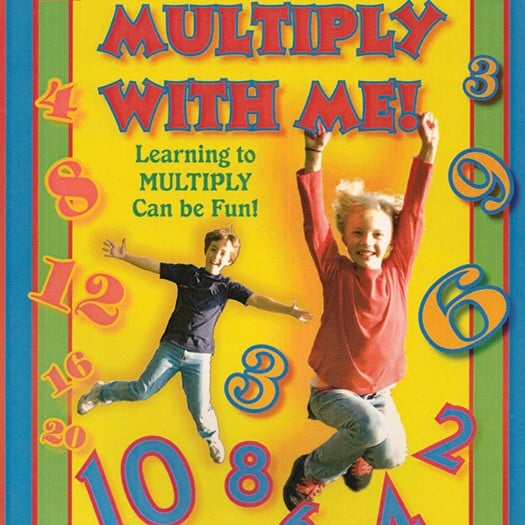

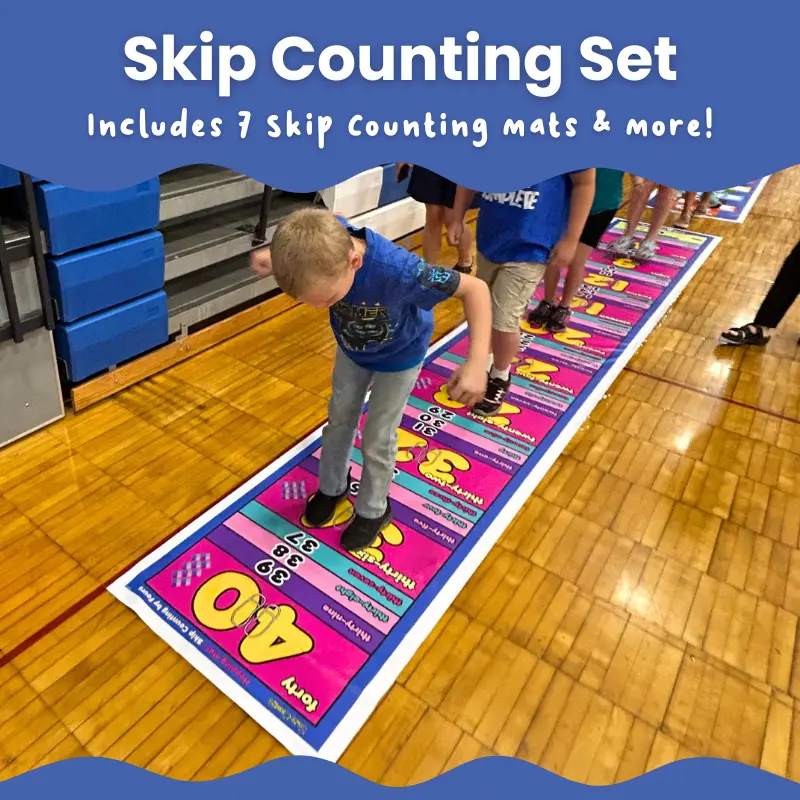
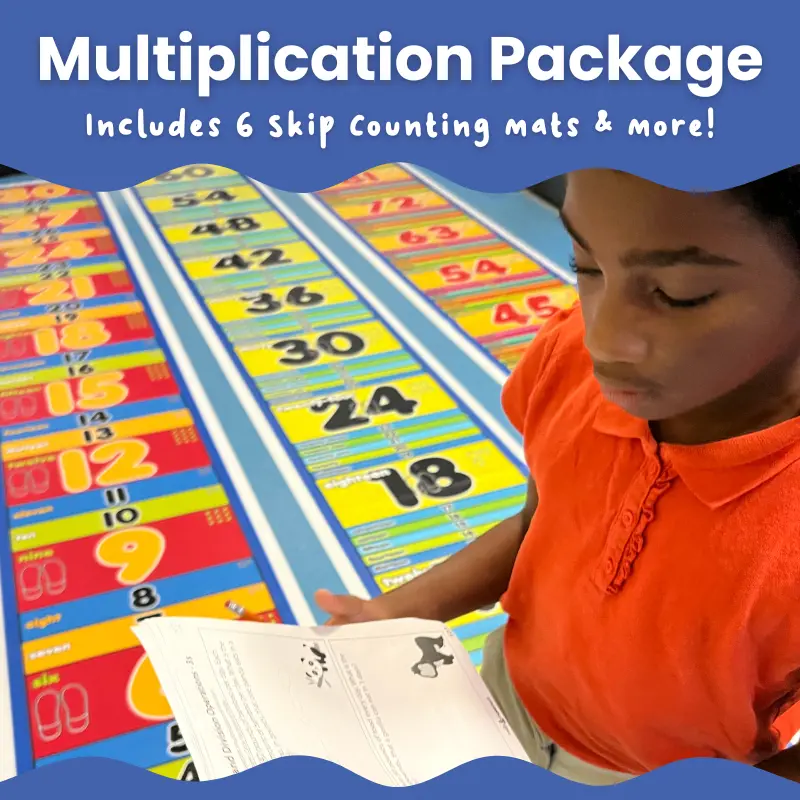
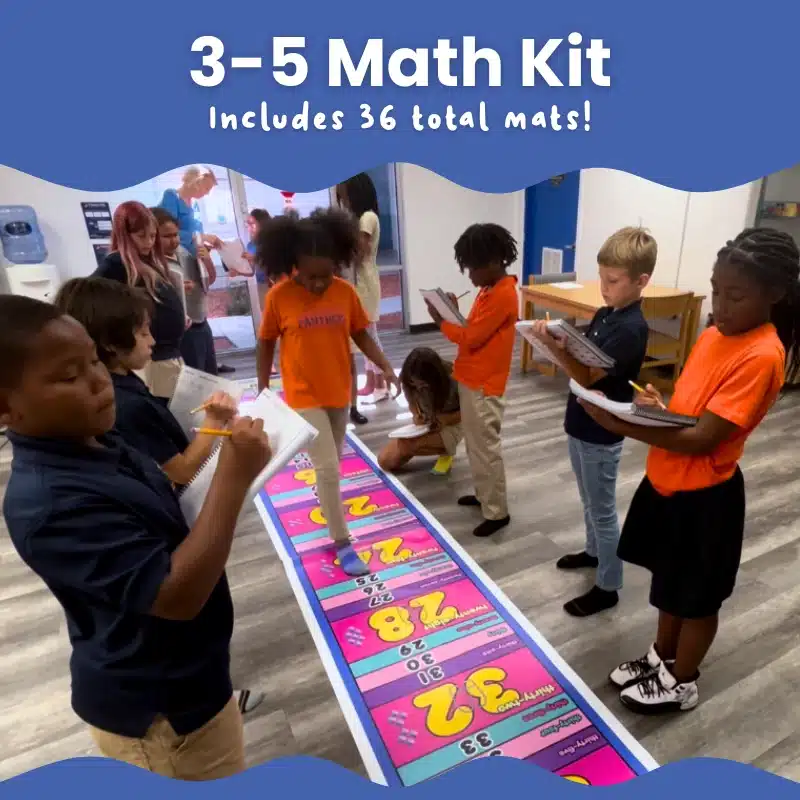
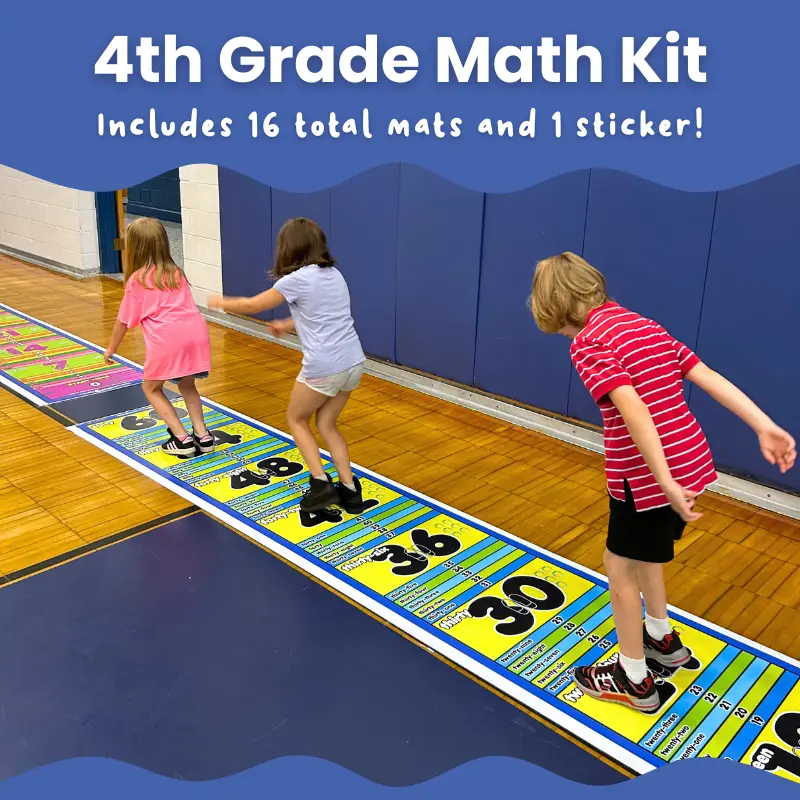
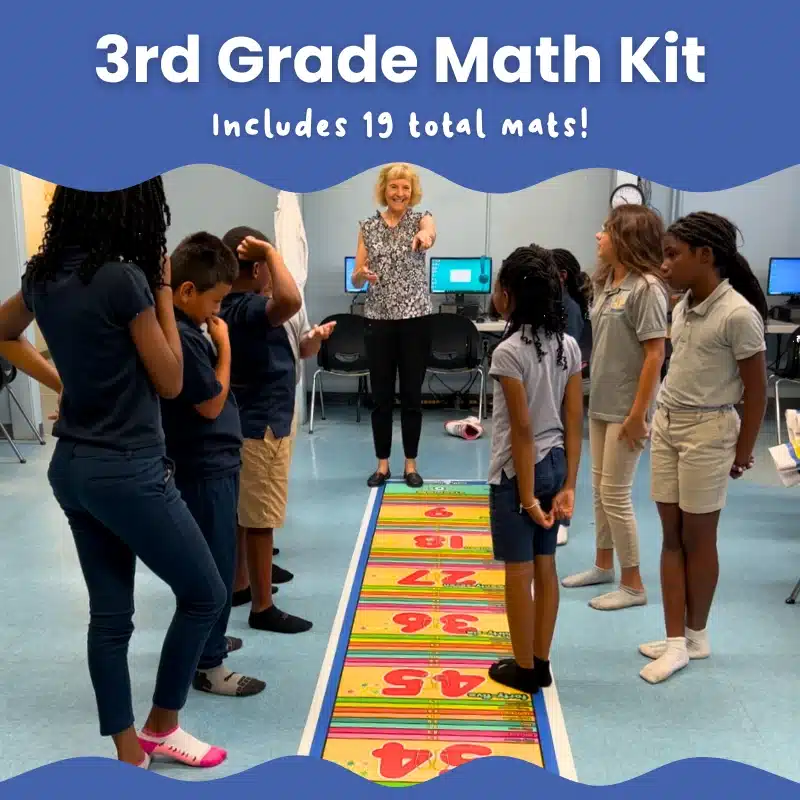
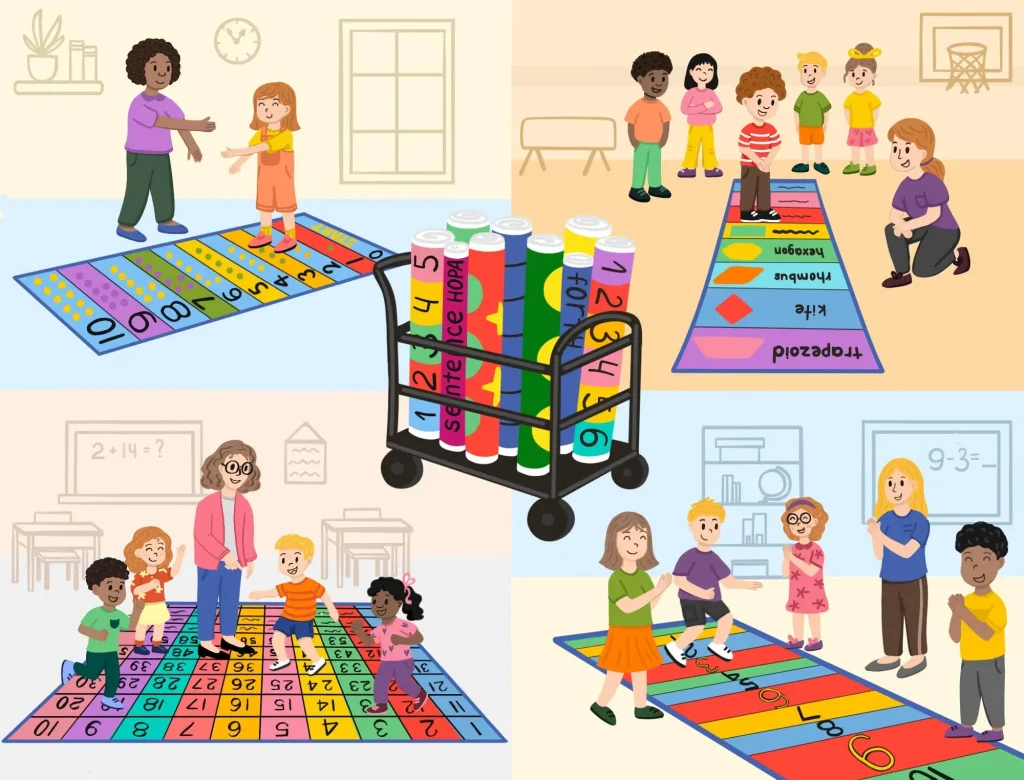
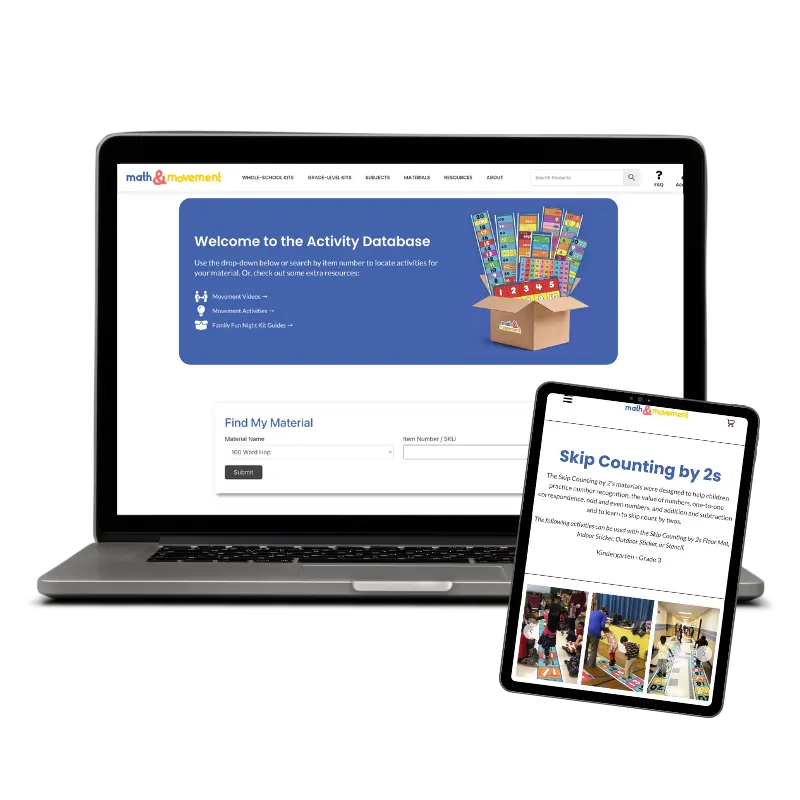

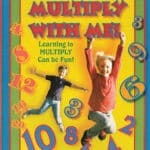
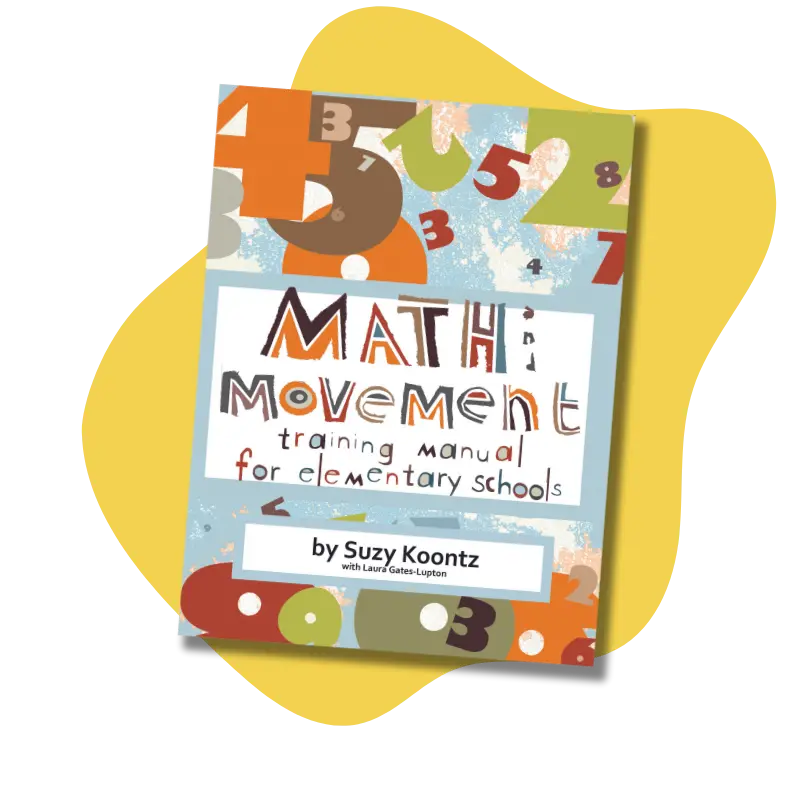
The instructor guide is a great resource for those parents who want to help their child with skip counting and multiplication, but aren’t sure how to go about doing it. This guide actually gives you words to say as a parent, but is adaptable to your needs!
The student workbook is a lesson guide for students to learn to skip count and multiply. I recently used this at a Math and Movement camp and the campers used it in conjunction with the mats. They really loved having both options and it had amazing results in our post testing! This book is also great to give out at Family Fun nights to help parents provide the needed movement based assistance at home. Best for 2 nd – 5th graders, but parts of it can be used with younger grades.